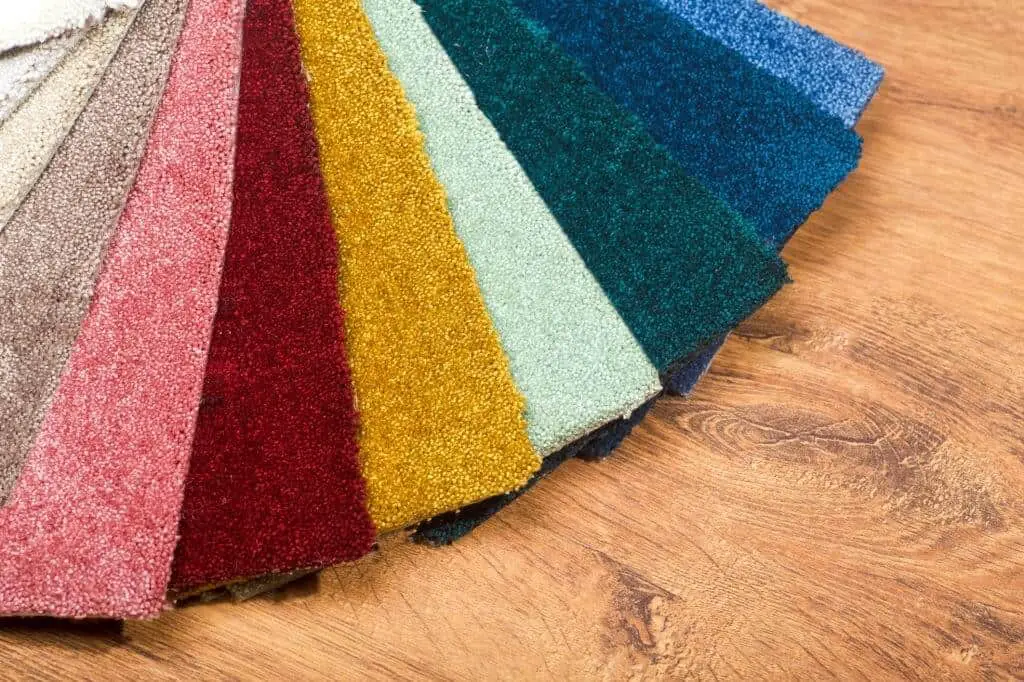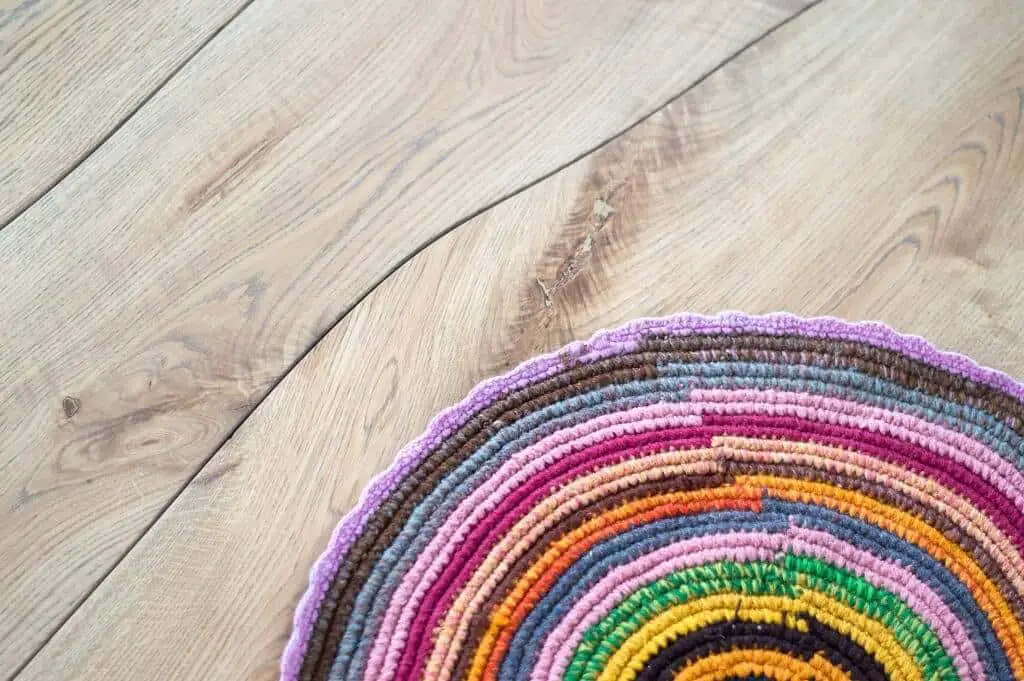If you are trying to figure out if polypropylene is safe on vinyl floors, then here we go. The simple answer is NO! Polypropylene rugs are not safe to be used on vinyl floors. If you’ve gotten a polypropylene rug before finding out it is not safe, a rug pad can help.
Why isn’t polypropylene safe on vinyl floors? Although vinyl floors have a general resistance to staining and scuffing, they can easily be discolored when a reaction occurs between the chemicals inside the rug backing and those present in the vinyl flooring.
Adding a rug pad that is safe to be used on all types of floor underneath your polypropylene rug will help to protect your vinyl floor from the discoloration and damage it could cause.
Read: Removing rug backing residue from hardwood floor
What Should You Not Use On Vinyl Plank Flooring?
Table of Contents
Vinyl plank flooring requires constant maintenance regardless of how long it has been installed. To keep your vinyl floor in the best condition, you need to put in some work and effort.
Although vinyl plank flooring is amongst the types of flooring that requires minimal maintenance lowest, using of the wrong product on your vinyl flooring could damage it. If you are trying to figure out what should you not use on vinyl plank flooring?
Here are some cleaning substances and products as well as cleaning practices that can damage your vinyl floor.
Cleaning With Too Much Water
Vinyl planks are not 100% water-resistant. They can only withstand a small amount of water; this is why you need to be mindful of the amount of water you use in cleaning your floor.
Exposing your vinyl floor to excessive moisture can cause water to get underneath your vinyl flooring planks, and this damages the glue that is used to hold the vinyl against the floor, and this results in lifted edges.
Exposure to moisture also softens the vinyl, which leads to a buildup of mold and bacteria. The use of excessive water on vinyl planks floors has a generally negative impact.
To protect your vinyl floor from being exposed to excessive moisture, you should take note of the following:
- Groundwater moisture
- Plumbing issues (toilet, sink, or bath)
- Crawlspace moisture
- Leaking or overflowing washing machine or dishwasher
If any issue is detected in any of these areas, they should be fixed properly. Issues in these areas should not be kept sitting for too long as the longer you wait to fix the issues
The deeper the water penetrates into the planks, making the needed repairs more complicated. You should also ensure to eliminate any moisture before installing your vinyl flooring.
Abrasives And Ammonia-Based Cleaning Products
You should never make use of abrasive cleaning products on your vinyl flooring, regardless of if they appear coarse or fine. Ammonia should also be avoided due to its strong base, which could damage your floor.
You should also avoid the use of bleach, cleansers, abrasive detergents, which can strip your floor of its shine and beauty. These types of cleaning products can damage the top layer of your flooring, which exposed your floor to the risk of cracking.
In order to prevent this from happening, always take note of every commercial cleaner before using it on your vinyl floor. Always check the composition of the product pack. And if there any form of abrasive or ammonia content, do not use it on vinyl flooring. Your vinyl flooring will last longer.
Using A Vacuum With A Beater Bar Or Power Brush Head
Vacuum is a great cleaning tool that can save you lots of effort and time when used correctly. When using a vacuum on vinyl flooring, ensure to remove its beater bar or power rotary brush head.
Instead, attach the brush attachment that is designed for plank flooring. This will enable you to use a vacuum effectively on your vinyl flooring without causing any damage.
You should also factor in the weight of your vacuum. When vacuuming, you push and pull the device; this is why it is important to check the weight of any device you make use of. Always opt for a vacuum that is portable and lightweight when intending to clean vinyl floor with it.
Using A Stiff-Bristled Brush
To make their vinyl floors extra shiny, many are tempted to scrub the floor using a stiff brush when removing tough stains. This might remove the stain successfully, but you will be left with scuff marks and scratches on the floor due to the abrasiveness of your cleaning tool.
Sometimes this might even look worse than the stain you initially tried to remove. If you have dried spilled substance on your floor, you should never use a knife to try and remove it.
This is due to the delicate nature of vinyl flooring that cannot withstand hard scrubbing. To remove any stain or stuck dirt, use a soft washcloth, and this is even more effective than hard scrubbing. Simply give your floor a mild scrub and mop, using the right cleaning solution; this should remove even the toughest stains.
Using Unsafe Commercial Cleaning Products
It is vital that you always opt for safe cleaning products at all times. This applies to both cleaning agents and cleaning tools like a mop. Not all cleaning products and tools are the same; some are better than others; certain cleaning agents are toxic for your vinyl floors as they contain harsh chemicals in their formulation.
There are different types of commercial agents in the market that can be used to clean vinyl floors. You can also make use of some everyday household items like baking soda and vinegar to clean vinyl flooring.
Always keep in mind that most common cleaning products marketed for vinyl flooring are not always safe, so endeavour to do proper research before using any cleaner on your floor.
Using Baking Soda And Vinegar
Yes, you can sprinkle some baking soda on your vinyl floor and lightly scrub with a soft wet sponge to eliminate stains off a vinyl floor. But you need to consider the effects the acidity of baking soda has on the vinyl planks.
This also applies to vinegar, which is a typical go-to cleaner that works amazingly on mirrors, laminate countertops, ceramic sinks and toilets, vinyl tile, and planks. Vinegar is also highly acidic. Frequent use of both cleaning agents can dull or even damage the finish on your planks.
Although the combination of the right amounts of vinegar and baking soda will help you to scrub off some stains from vinyl floor, they are really not that effective, and even if they are, you do not want to risk damaging your floor just so you can save a couple of bucks on cleaning supplies.
Remember that vinyl floors are not repairable, so once your luxury vinyl flooring is ruined, that’s the end of it. So, try to invest in good cleaning products that will enhance the life of your floor.
Conclusion
This article answers the question “is polypropylene safe on vinyl floors” as well as what should you not use on vinyl plank flooring? Vinyl flooring, although durable, are also very delicate; damaged vinyl flooring is irreparable; this is why it is important to use the right products and tools when dealing with it.

